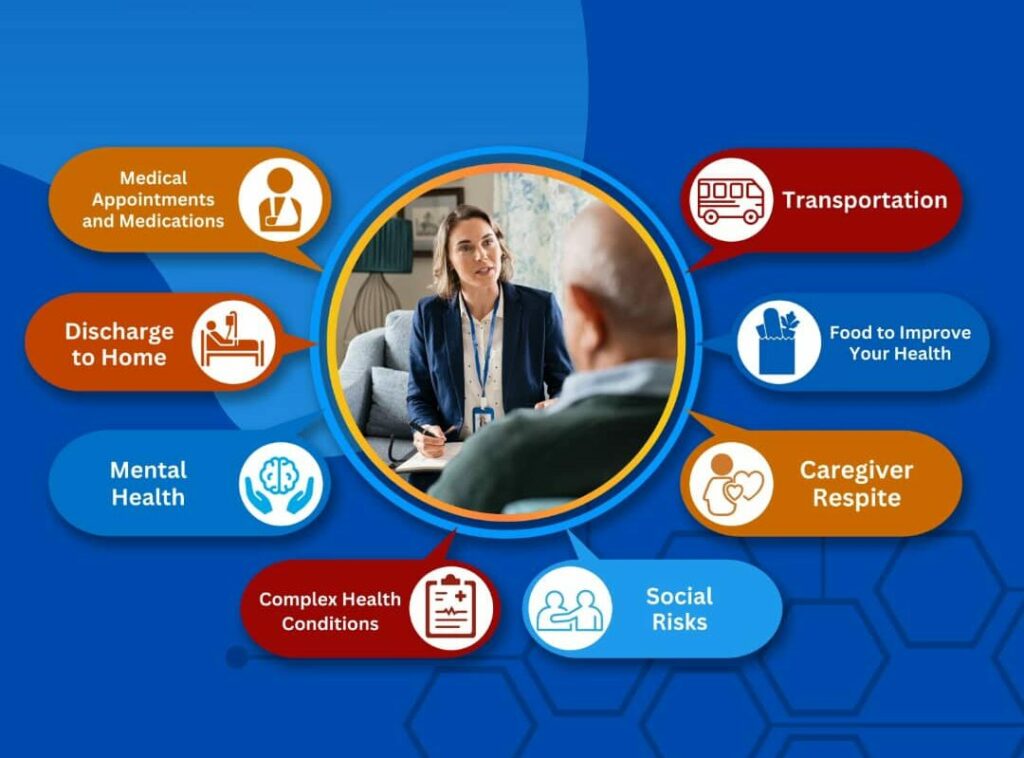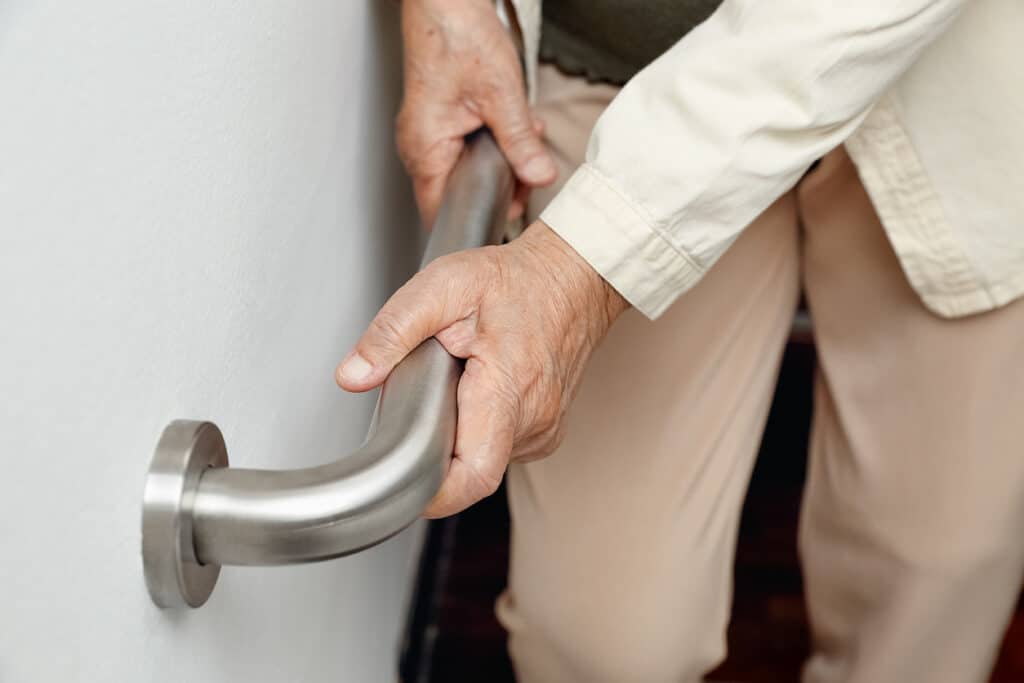Enhanced Care Management
Enhanced Care Management (ECM) is a free service offered by Oxnard Family Circle to help Medi-Cal seniors and disabled adults get the care and support they need. ECM gives extra help to seniors and disabled adults who have many serious health problems.
Enhanced Care Management (ECM) provides extra support to Medi-Cal seniors and disabled adults with very complex health and social needs. ECM gives seniors and disabled adults an entire care team, led by a care coordinator, to help manage all their care.
Providing Enhanced Care Management Services in Ventura County, including Oxnard, Ventura, Camarillo, Thousand Oaks, Fillmore, Santa Paula, Piru, Simi Valley, Port Hueneme, Ojai, Moorpark, and surrounding areas.

The ECM care team takes a hands-on, personalized approach to address both medical and non-medical needs.
- They conduct a full assessment to understand everything affecting a member’s health, from chronic conditions to lack of housing or food access.
- Then they create a customized care plan to coordinate care across all the members’ providers and services:
- Primary care doctors
- Specialists
- Mental health professionals
- Substance abuse counselors
- Pharmacists
- Case managers
- In-home supportive services
- And more
- The care team helps our members to make appointments and accompany if needed, arrange transportation, fill prescriptions, and follow treatment plans. We offer wrap around care that incudes managing medical condition and social risks like food insecurity, housing instability that may lead to homelessness, poverty, and other factors that negatively impact an individual’s health, well-being, and overall quality of life. Our Lead Care Mangers and Community Health Workers meet with our members to ensure that everyone receives comprehensive, coordinated, and personalized care.
- They focus on open communication to ensure everyone is on the same page. The goal is seamless care integration.
Oxnard Family Circle officially opened its doors in July of 2002. Since then, Oxnard Family Circle Adult Day Health Care Center has been striving to be the best provider of Adult Day Healthcare. We treat all patients with a caring attitude and phenomenal service.
Adult Day Healthcare welcomes adults of all ages, genders, ethnicities, and cognitive abilities. Our population includes people from all walks of life, including Veterans and Civilians. We cater to Ventura County’s ethnically diverse population.
In addition, Oxnard Family Circle, through Enhanced Care Management can connect seniors and disabled adults to other health-related community resources and social services.
This may include help with housing, food access, job training, or other needs affecting their health and well-being. Addressing these social factors is key to better managing complex conditions.
ECM meets seniors and disabled adults wherever is convenient for them, at home, at Oxnard Family Circle Adult Day Health Care, whether at medical appointments, shelters, or anywhere in the community.
The relationships care teams form with seniors and disabled adults are essential. Building trust allows seniors and disabled adults to communicate their full range of needs to coordinate their most effective treatment plans.
Enhanced Care Management provides member-centered, equitable care to those with intensive needs. It breaks down barriers to care access by extending coordinated services into the community and focusing holistically on medical and social needs of seniors and disabled adults.

Community Supports Through Enhanced Care Management
Community Supports provide alternative services that can help Medi-Cal seniors and disabled adults manage health conditions and avoid needing higher levels of care.
For example, having their home modified to be more accessible after surgery so they can recover at home instead of a care facility. Services address social factors affecting seniors and disabled adults health.
What are the Enhanced Care Management Services?
Outreach and Engagement
ECM Providers are responsible for reaching out to and engaging with assigned seniors and disabled adults in several ways, such as in-person, mail, telephone, community, or street outreach.
Comprehensive Assessment and Care Management Plan
The Comprehensive Assessment will assess the clinical and non-clinical needs of a Member, and the Care Management Plan will be based on the Member’s individual progress or changes in their needs.
Enhanced Coordination of Care
Intensive, primarily in-person contact with the Member and their family member(s), guardian, authorized representative (AR), caregiver, and/or authorized support person.
Health Promotion
Services to encourage and support seniors and disabled adults receiving ECM to make lifestyle choices based on healthy behavior, with the goal of motivating seniors and disabled adults to successfully monitor and manage their health.
Comprehensive Transitional Care
Services intended to support ECM seniors and disabled adults and their families and/or support networks during discharge from hospital and institutional settings.
Member and Family Supports
Activities that ensure ECM seniors and disabled adults and their families and/or supports are knowledgeable about the Member’s conditions, with the overall goal of improving their adherence to treatment and medication management.
Coordination of and Referral to Community and Social Support Services
Determining and coordinating appropriate services to meet the needs of seniors and disabled adults, including services that address social determinants of health (SDOH), needs such as housing and/or other offered services.
There are 14 types of Community Support:
These services promote living stable, healthier lives in the community vs. institutional care. They help seniors and disabled adults manage medical needs while addressing social factors like food, housing, and support systems.
Community Supports bridge the medical and social drivers of health to give seniors and disabled adults alternate solutions for avoiding high-cost settings. This advances equitable, whole-person care.
Housing Services:
- Help finding housing
- Paying deposits
- Support to sustain tenancies
- Short-term housing after hospital stays
Daily Living Assistance:
- Recuperative care facilities for medical respite
- Day habilitation programs
- Caregiver respite services
- In-home personal care and homemaking
Transitions Between Care Settings:
- Help moving out of nursing facilities
- Support when leaving hospitals or incarceration
Home Modifications:
- Changes to improve accessibility like ramps or grab bars
Other Assistance:
- Medically tailored meals or groceries
- Sobering centers
- Reducing asthma triggers at home

